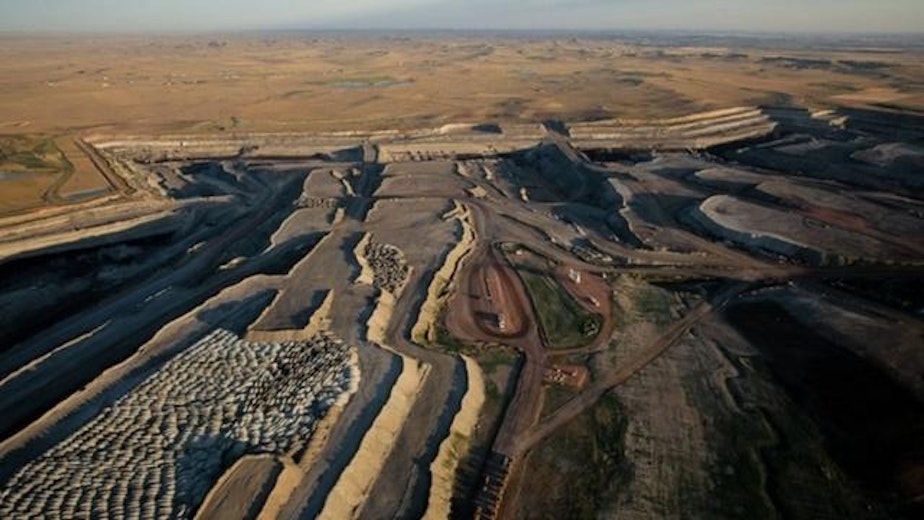Inaccurate Coal Leases Cost Taxpayers 'Millions'

Leases for coal mining on public lands in the West are costing taxpayers millions because they should be bringing in more money, a new government study suggests — and the problem could get worse if that coal gets exported through the Pacific Northwest.
A much-anticipated report released Tuesday by the Government Accountability Office found the Bureau of Land Management’s program for coal leases relies on outdated information and does not fully account for the higher price coal gets when it’s exported. A result: The BLM leases public land at low prices that don’t return taxpayers their fair share.
Federal land produces 450 million tons of coal — 40 percent of all U.S. coal — and all but a fraction of it is mined in the western states Wyoming, Montana, Colorado and Utah. The government leases public land in those states to mining companies, generating about $1 billion annually.
Undervaluing those leases may have cost taxpayers up to $200 million, according to calculations from the staff of Sen. Ed Markey, D-Mass., who requested the GAO report.
Coal exports have risen in recent years because the domestic market slumped, but still only a small percent of Powder River Basin coal gets shipped abroad. That’s because coal companies operating in the Inter-Mountain West lack an economical way to get coal out of the country and into foreign markets.
If any of the proposed Pacific Northwest export terminals became operational, they would enable a much cheaper export option and would change the game for coal leases, said Darren Epps, who follows the coal industry for SNL Energy.
In terms of unrealized revenues for the U.S. treasury, Epps said, “When you look at ignoring exports now, you’re looking at $200 million. But if those terminals get built, that probably starts with a B, and it’s billions.”
Because coal leases can last for 20 years, taxpayers could be hurt for years to come if those agreements don’t account for how much of that coal will be shipped overseas. After all, coal sold to burgeon markets in Asia fetches higher prices than coal sold for domestic use — mainly to be burned in U.S. power plants.
For that reason, environmental groups and legislators have asked for a temporary suspension of leases until the program is fixed. In 2013, there were no new leases because of a down market.
Opponents of coal exports in the Pacific Northwest hope costlier leases are a disincentive for companies mulling exports through the region.
“For those communities along the rail line in the Pacific Northwest, if coal isn’t as cheap and as accessible, there’s a really good chance we will see less of it going through their communities,” Krista Collard, regional spokeswoman for the Sierra Club’s Beyond Coal campaign.
In addition to the BLM undervaluing coal bound for foreign markets, the GAO report found that some of the agency’s offices lack rationale for how they set prices, that the agency does not obey federal law requiring competitive leases, and that it violates its own guidelines for public sharing of information.
The BLM is part of the U.S. Interior Department A statement from spokeswoman Jessica Kershaw said the department has already begun implementing a number of reforms to improve the BLM’s coal program. The Interior Department intends to address recommendations from recent reviews, she said.
“The department remains fully committed to ensuring that taxpayers receive a fair return from the development of coal resources on public lands and is actively strengthening the Bureau of Land Management’s coal leasing program,” Kershaw said.
Problems with the the BLM’s coal lease program have been known since the early 1980s, when the GAO (then the General Accounting Office) revealed that the government lost roughly $100 million from undervaluing coal leases.
A recent increase in coal export activity prompted further scrutiny of the program over the past few years, including an investigation from Reuters and an economic analysis from the Institute for Energy Economics and Financial Analysis. Those prompted a call from Sen. Ron Wyden, D-Ore., for the Department of Interior, which oversees the BLM, to investigate the agencies practices.
“Today’s GAO report, which my staff continues to review, raises new concerns about Interior’s leasing process that should be further explored,” Wyden said in a statement. “Since raising concerns about the coal program and royalty receipts last year, I have continued to investigate whether taxpayers get a fair return from the coal program. This is an issue that deserves time and attention, I plan to continue digging deeper.”
Copyright 2014 EarthFix. To see more, visit earthfix.kuw.org.
